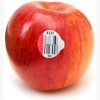Raise your hand if you’ve ever accidentally eaten the little produce sticker on an apple?! I’ve informally polled my friends and every single one of them has had a PLU sticker, or product lookup sticker, in their stomach (also known as Direct Food labels). The internet is awash with false claims about those PLU stickers so we wanted to set the record straight on a few things that people often ask.
- By and large, these produce stickers are NOT biodegradable and must be removed before composting
- Eating a PLU sticker won’t kill you, but it is not “edible” and we advise against consuming it
- PLU stickers are a bit of a supply chain marvel and we aren’t trying to get rid of them, but do think the industry can better consider end of life when designing them.
- The produce sticker (and the composting fiasco it can create) reminds us why we need to be so thoughtful and careful to design for the optimal end of life.
Produce stickers are NOT biodegradable. These stickers are typically made with a thin layer of plastic, most commonly vinyl (though occasionally paper is used). Plastic is functionally important because it means the stickers can better withstand water, sprays, transit and packaging as it moves from the producer to the shipper to the retailer. But the use of vinyl and other thin plastic films means these stickers do not compost or biodegrade and you should remove the sticker before composting.
Industrial composting facilities are happy to get our food waste, but are really struggling with the PLU sticker contamination issue. Screening out these stickers is time consuming and challenging. Because of how tiny, thin and pliable they are, stickers will often get through the screens designed to catch them – leaving a sticky, plastic mess in the resulting compost.
We should all take steps to reduce the amount of trash that’s sent to landfills and recycle wherever possible, but in the case of produce stickers it’s best to take them off your fruit right away and send them to the landfill in the trash(for now). While many eco-conscious consumers are opting for a more locally focused food lifestyle, the farmers market isn’t a viable option for many of us all year round. A global supply of produce means that PLU codes and produce stickers are likely here to stay (and of tremendous benefit to retailers and consumers).
But the challenges these stickers are posing for home and industrial composters is a signal that as households, communities and countries are rethinking waste management and landfill diversion, we also need to redesign labels and packaging to align with the best possible end of life scenario for each item. In other words, we need to design more thoughtfully for end of life.

